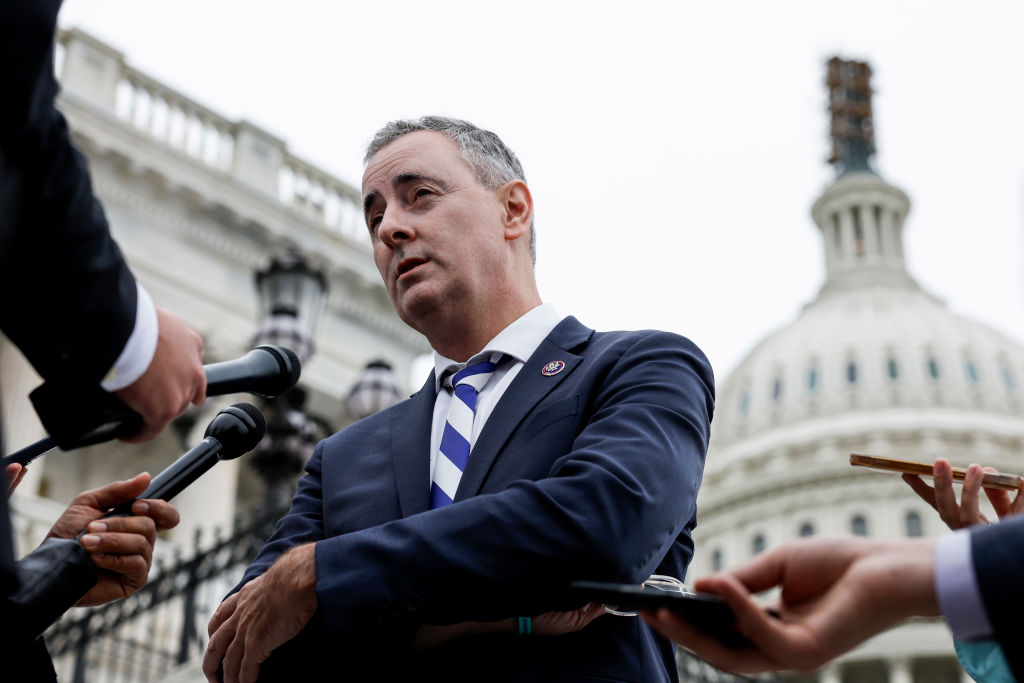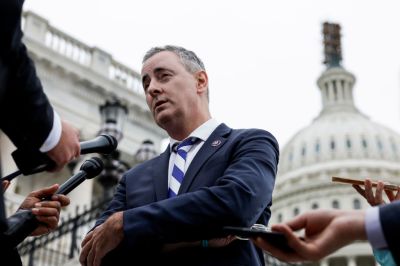We’re hosting our first Premium Town Hall meeting on Tuesday, December 10, at 8 p.m. ET exclusively for Dispatch Premium members. You’ll be able to ask your favorite Dispatchers your burning questions: What do we think of the forming Trump administration? Do we think there will be any more surprise nomination withdrawals? How are we surviving the cold snap in DC? We’ll answer all these questions and more on Tuesday.
We’ll send out more details and a registration link in the next few days—but remember, these town halls are exclusively for Dispatch Premium members. If you’d like to join us, make sure to upgrade your membership today.

At long last, the House results are finally all in. And the verdict for Democrats is one of the only bright(ish) spots from a very gloomy 2024.
With a net gain of two seats, Democrats managed to shave down the Republican majority to the narrowest margin in the body’s history. With a 220-215 edge, Republicans can afford to lose only two members on any vote and still advance legislation.
Compared to the expectation at the start of the year that Dems would easily overtake the GOP, two seats doesn’t sound like much. But given that their party lost the national popular vote—historically of close correlation to the House result—for the first time in 20 years, gaining any ground at all looks pretty impressive.
Like the starving guys’ hallucinations on the desert island in the Bugs Bunny cartoon, that 215-seat House minority is looking like a steak dinner to Democrats hungry for any kind of good news.
Then follows the logical question: Which kinds of Democrats won in a year when so much else went wrong?
Helpfully, my American Enterprise Institute colleague Nate Moore has compiled the master list of Democratic House candidates in competitive districts who substantially overperformed Vice President Kamala Harris. It would be too simple to say that had Harris done as well as these House candidates she would have won the election, but these are certainly the kinds of districts that made the difference in the presidential election.
Take a look at Nate’s work at the site of my other colleague, Ruy Teixeira, The Liberal Patriot:

The theme that runs through these candidates is their moderate brand. Candidates like Reps. Gabe Vasquez of New Mexico, Jared Golden of Maine, and Marie Gluesenkamp-Perez of Washington are all notable for their studied moderation and willingness to buck their party.
And while it’s no surprise that moderate Democrats would do better than Harris in districts won by Donald Trump, check out Rep. Pat Ryan from suburban New York, who ran more than 11 points ahead of Harris in a district she won decisively.
There are some lessons here for the Democratic Party writ large and its need to appeal to normie voters instead of satisfying the different pressure groups inside the party, but also for individual House members and candidates looking for a way to make the most of the 2026 midterms. The light blue hue may suit them best.
But let’s flip this around. How about the Republicans in competitive districts who outperformed Trump?
New Jersey’s 7th District
- President: Trump +1.2 points
- House: Thomas Kean Jr. +5.4 points
Pennsylvania’s 1st District
- President: Harris +0.3 points
- House: Brian Fitzpatrick +12.8 points
New York’s 17th District
- President: Harris +0.5 points
- House: Mike Lawler +6.2 points
Nebraska’s 2nd District
- President: Harris +4.6 points
- House: Don Bacon +1.9 points
Virginia’s 2nd District
- President: Trump +0.3 points
- House: Jen Kiggans +3.8 points
It’s harder to outperform a winning presidential candidate than it is a losing one, so these folks are, in that sense, even more impressive than the Democratic survivors listed above.
But just like their Democratic counterparts, what these Republicans have in common is their explicit moderation and willingness to work in a bipartisan fashion. The star of this class, Fitzpatrick, is the co-chairman of the avowedly centrist Problem Solvers Caucus.
Republicans are right now not much interested in exploring the results of the 2024 election beyond reveling in the big shifts in urban areas and with nonwhite voters. But when they’re trying to hold on to their teeny-tiny majority in 2026, they will need to look more seriously at this year’s results.
The verdict for the red team is the same as it is for the blue: Swing voters favor moderation. And if there’s a mandate for anything from this year’s results it’s the same one we’ve seen in cycle after cycle for a decade: The majority markers in American politics sit squarely in the squishy center.
Holy croakano! We welcome your feedback, so please email us with your tips, corrections, reactions, amplifications, etc. at STIREWALTISMS@THEDISPATCH.COM. If you’d like to be considered for publication, please include your real name and hometown. If you don’t want your comments to be made public, please specify.
STATSHOT
Polling Roulette

TIME OUT: LETTER OF THE LAW
The Dial: “According to forensic linguists, we all use language in a uniquely identifiable way that can be as incriminating as a fingerprint. The word ‘forensic’ may suggest a scientist in a protective suit inspecting a crime scene for drops of blood. But a forensic linguist has more in common with Sherlock Holmes in ‘A Scandal in Bohemia.’ … The term ‘forensic linguistics’ was likely coined in the 1960s by Jan Svartvik, a Swedish linguist. … Today, the field is perhaps still best known for its role in solving the ‘Unabomber’ case in the United States. … The lone bomber was careful not to leave any fingerprints or DNA traces. … But in 1995, he made a crucial mistake. He told the police he would pause his attacks on the condition that a newspaper publish his 35,000-word anti-technology manifesto. … Spellings such as ‘wilfully’ for ‘willfully’ and ‘clew’ for ‘clue’ pointed to someone from the Chicago area, for example. Eventually, the linguistic evidence was strong enough to issue a search warrant for the home of a reclusive mathematician named Theodore Kaczynski.”
HIGHER TURNOUT WOULDN’T HAVE SAVED HARRIS
New York Times: “After the election, we analyzed election records to see who did and didn’t vote. The results suggest that higher turnout wouldn’t have been an enormous help to Harris. That may be surprising. … But in a presidential election, turnout and persuasion often go hand in hand. The voters who may or may not show up are different from the rest of the electorate. … Clark County, Nev., which contains Las Vegas, is an example. … Lower Democratic turnout would explain only about one-third of the decline in Democratic support in Clark County, even if one assumed that all Democrats were Harris voters. … In Las Vegas and elsewhere, our data suggests that most voters who turned out in 2020 but stayed home in 2024 voted for Biden in 2020 — but about half of them, and maybe even a slight majority, appear to have backed Trump this year. Regardless, there’s no reason to believe that they would have backed Harris by a wide margin.”
The extinction of red-state Senate Democrats: UVA Center for Politics: “As part of winning back the Senate majority in 2024, Republicans completed a task that had been years if not decades in the making: They finally won all of the Senate seats in the states that have consistently voted Republican for president for at least the past quarter century. … For the first time in the history of Senate popular elections, Republicans will hold all 40 of the Senate seats from these states after flipping Montana and West Virginia. … Democrats now hold 10 seats in states Trump won in 2024: both seats in Arizona, Georgia, Michigan, and Nevada and a seat apiece in Pennsylvania and Wisconsin. Granted, we just saw the best Republican presidential performance in 20 years, but this does help illustrate the Democratic challenge in the Senate: They have been doing better in the most competitive presidential states than the Republicans, but they still will find themselves in the minority next year.”
Wisconsin’s Wikler joins crowded race for DNC chair: Politico: “Ben Wikler, leader of the Democratic Party of Wisconsin, announced Sunday that he is running to be the next chair of the Democratic National Committee. … Other candidates in the DNC race so far include Martin O’Malley, former governor of Maryland, and Ken Martin, Minnesota’s party chair. James Skoufis, a state senator from New York, is also in the mix. … ‘This is a purple, intense state,’ he said. ‘And what it teaches you when you fight in a state like Wisconsin is how to organize everywhere in rural areas, cities, suburbs, small towns, across race, ethnicity, gender, geography.’ … The DNC election is slated for Feb. 1. The current chair is South Carolina Democrat Jaime Harrison, who is not running again.”
Johnson will sit atop narrowest House majority in history: New York Times: “On Tuesday night, the final House race was called … cementing a 220-215 majority for Republicans in a margin even slimmer than they have now, at 220-213. Those margins will erode even further in January, when Representatives Elise Stefanik of New York and Mike Waltz of Florida resign to take jobs in the Trump administration. Former Representative Matt Gaetz of Florida has also given notice that he will not return. … Republicans will then be down to a 217-215 majority, on par with the narrowest controlling margin in House history. If all Democrats are present and united in opposition to a measure, Mr. Johnson won’t be able to afford a single defection on the House floor. … He and other congressional leaders are looking to pass a short-term spending bill later this month — paired with a measure providing disaster aid for southern states ravaged by Hurricanes Helene and Milton — that would punt the government funding deadline to March.”
DeSantis emerges as potential replacement for Hegseth: Wall Street Journal: “President-elect Donald Trump is considering Florida Gov. Ron DeSantis as a possible replacement for Pete Hegseth, his pick to run the Pentagon. … Picking DeSantis, a 2024 GOP primary rival for the presidency, would amount to a stunning turn for Trump. But he would also find in the governor a well-known conservative with a service record who shares Trump’s—and Hegseth’s—view on culling what they see as ‘woke’ policies in the military. … The discussions are in their early stages, one of the people said, adding that Trump has floated DeSantis’s name in casual conversations with guests at Mar-a-Lago, his private Florida club. … Another potential defense-secretary candidate who has been discussed by Trump allies … is Elbridge Colby, a former Pentagon official and ally of Vice President-elect JD Vance. Trump is also considering Sen. Joni Ernst (R., Iowa) for the job.”
BRIEFLY
Adam Gray ousts Rep. John Duarte in last uncalled House race—AP
Detroit mayor launches independent gubernatorial bid—Detroit Free Press
Nadler drops judiciary leadership, endorses Raskin—New York Times
Former Rep. Billy Long tapped for IRS commissioner—Politico
WITHIN EARSHOT: SENIORITIS
“I’m about to get the f*** out of here. Ask somebody else.”—Sen. Jon Tester laughs off reporters’ questions about Joe Biden pardoning his son. Tester lost reelection in November to Republican Tim Sheehy.
MAILBAG
“For nine years now, I’ve been thinking that this Trumpy thing will wear thin and evaporate, leaving a vacuum that conservatives will fill and then rebuild the Republican Party, seating it firmly on the pillars of Reaganism: a limited government bound by fiscal discipline, a muscular foreign policy exercised through alliances, a coherent international trade regime that supports American interests, and a social conservatism grounded in common sense and toleration. But I was whistling past the graveyard, wasn’t I? The Republican party is not going through a phase, is it? So, tell me: whither conservatives? Would it make sense to throw themselves into the Democratic Party? It is, after all, a self-consciously coalitional party. Might conservatives succeed by contending on even footing with the other constituents? Might conservatives find receptive ears among some of these constituents, such as African Americans, or Hispanics, a majority of whom still vote for Democrats? Might Liz Cheney, Adam Kinzinger, and other former Republicans join arms with those neoliberals now saying to their fellow Democrats, “I told you so!”? Might some old southern Blue Dogs be enticed to return from exile by an infusion of conservative blood? Or am I dreaming?”—Darrel Colson, Shreveport, Louisiana
Mr. Colson,
They’re all phases! It’s just that some are longer than others.
Fifty years ago, the Democratic Party was wildly ascendant, having forced the sitting Republican vice president from office the year before over corruption charges. They followed up with the ultimate prize the next year with the August 1974 resignation of Richard Nixon. Three months later, to no one’s surprise, Democrats won a smashing victory in the midterm elections.
But guess what House Speaker Carl Albert had to say about it? “This is not just a victory, this is a mandate,” the Oklahoma Democrat crowed. But, of course, it wasn’t. As the very narrow 1976 presidential election confirmed, there had not been a stampede toward Democrats, but one away from the disgraced Nixon.
Democrats were still stuck with their baggage: anti-war radicals in their party, the uneasy relationship between urban black voters new to the party and the pro-union working class white voters left over from the New Deal coalition, etc. If you can’t win big when inflation is sky-high and the sitting president pardoned his corrupt predecessor, when would you? The thrashing Democrats took in 1980 made it clear that the Democratic coalition was kaput.
Which gets us to your question. Ronald Reagan didn’t win in 1980 so much as Jimmy Carter lost. Certainly, Republicans were not united behind the Reaganite ideals you correctly identify as the pillars of late 20th century conservatism. Had Reagan failed to deliver results and lost reelection, many Rockefeller-style Republicans would have lined up to take the party back to the old Nixonian, activist, technocratic approach.
Republicans became Reaganite conservatives because that approach delivered three consecutive presidential landslide victories. Indeed, when Reagan’s former vice president lost in 1992, Republicans went back to an old-school Republican with Bob Dole for the next cycle. As the party slogged through a series of defeats and narrow victories for the next 20 years, I suspect they pined for Reagan’s electoral results more than they did his specific policies.
Back-to-back losses by traditional Republicans in 2008 and 2012 had set the party up for a sharp reversal of course. What shaped history so dramatically was that Donald Trump was the man who happened to be in the right place at the right time to take advantage of it.
The hero of Patrick O’Brian’s swashbuckler novels set in the Napoleonic wars is “Lucky” Jack Aubrey, and a key element in the stories is the captain’s fear that reversals will cause the superstitious sailors to think him lucky no more. The crew trusted him because he won, not because of his methods, which they often disliked. That trust, in turn, delivered victories that affirmed his moniker. If the cycle was broken, they would all be doomed.
Political parties are much the same. It’s the winning that people really like. The specific policies can mostly be backfilled after the fact.
After Vice President Kamala Harris’ bold experiment of embracing the kind of hawkish conservatives you mentioned, I think it very unlikely that her party will have an appetite for more Reaganism. Nor do I suppose that the conservatives will have much desire to hang around in a party that seems to be rapidly concluding that the answer to its losses is to outpopulist the populists.
What comes next for both parties will depend very much on what works. If Trump leaves office with a record of peace and prosperity, Republicans will clamor for more of the same. If his four years are a bust, the GOP will walk away from MAGA in the same way it did Nixonian politics and policies.
To establish a lasting coalition, a party has to first get lucky and then succeed on its own. Republicans have the ball back after President Joe Biden’s fumble, but we don’t yet know if they can score.
In that way, the choices of the small slice of persuadable voters who decide our elections do more to shape the preferences of die-hard partisans than any ideological arguments within the parties themselves.
Ahoy,
c
You should email us! Write to STIREWALTISMS@THEDISPATCH.COM with your tips, kudos, criticisms, insights, rediscovered words, wonderful names, recipes, and, always, good jokes. Please include your real name—at least first and last—and hometown. Make sure to let us know in the email if you want to keep your submission private. My colleague, the appropriately festive Nate Moore, and I will look for your emails and then share the most interesting ones and my responses here. Clickety clack!
CUTLINE CONTEST: CATCHING FLACK

Sometimes, a picture is just too perfect. In this week’s Cutline Contest—the last of November because of the Thanksgiving recess hangover—the photo of President-elect Donald Trump and his pick to be the nation’s chief spymaster, former Rep. Tulsi Gabbard, drew similar responses from scads of entrants. The winner wasn’t going to be the one that imagined the two serenading each other, but the version of that gag that was funniest and best matched the picture. And so, we give you the final entrant in November’s contest (and a shot at the fast-approaching annual ham prize):
“Trump and Gabbard treat town hall meeting guests with a surprise rendition of ‘The First Time Ever I Saw Your Face.’”—Kevin Cook, Fort Worth, Texas
Winner, Not Easy Being Green Division:
“If you’re worried about something stuck in your teeth, don’t order the spinach salad, Tulsi!”—Allan Rutter, Prosper, Texas
Winner, Toothsome Division:
“My next primary run will go better with these veneers.”—Michael Smith, Georgetown, Kentucky
Winner, Here Comes The Boom Division:
“Mic drop on three, you ready Tulsi? Ok, one, two …”—Donnie Bishop, New Castle, Virginia
Winner, Dnieper Know Until You Try Division:
“You had me at ‘I would encourage Russia to do whatever the hell they want.’”—Rick Whaley, Portage, Michigan
Winner, George and Ira Division:
“Embrace me, you sweet embraceable you”—Bob Goldman, Gilroy, California
November Winner
Ham season draweth nigh, dear friends! This month’s winner gets the penultimate ticket to play for a delicious Edwards of Virginia Wigwam ham (or smoked turkey equivalent) in the annual contest. And since December will be holiday-shortened, with just two weekly contests, we are really coming down to the rind, people.
But before we get to the thrilling and salty conclusion of 2024, let’s pause to celebrate November’s winner, George Spence of Bentonville, Arkansas, who scored on this picture of a crowd at a sports bar watching the Trump-Harris debate:
“Smiles emerge as the Sweet Meteor of Death approaches”
Please send us your mailing address, Mr. Spence, so that we can send along your prize, SMOD bumper stickers, of course.
THE LAST PLACE THEY’LL THINK TO LOOK WTVR: “Dozens of Chesterfield County [Virginia] police officers and sheriff’s deputies gathered at the IronBridge Road Walmart on Sunday for the annual ‘Shop With a Cop’ event, a holiday tradition where law enforcement helps children pick out presents. The event took an unexpected turn when officers were told about a shoplifting inside the store. … Police were stunned that the man, later identified as 32-year-old Hector D. Velazquez Maldonado of Chesterfield County, even attempted the crime given the overwhelming police presence visible both inside and outside the store. ‘We had 30-40 marked patrol cars in the parking lot,’ [Chesterfield County Police Lt. James Lamb] said. ‘When we found his vehicle, it was facing where our cars were parked, so he would have had to see them. It seems it just didn’t matter to him.’ He is now facing a felony charge of grand larceny after police say he attempted to steal nearly $1,400 worth of items.”






Please note that we at The Dispatch hold ourselves, our work, and our commenters to a higher standard than other places on the internet. We welcome comments that foster genuine debate or discussion—including comments critical of us or our work—but responses that include ad hominem attacks on fellow Dispatch members or are intended to stoke fear and anger may be moderated.
With your membership, you only have the ability to comment on The Morning Dispatch articles. Consider upgrading to join the conversation everywhere.